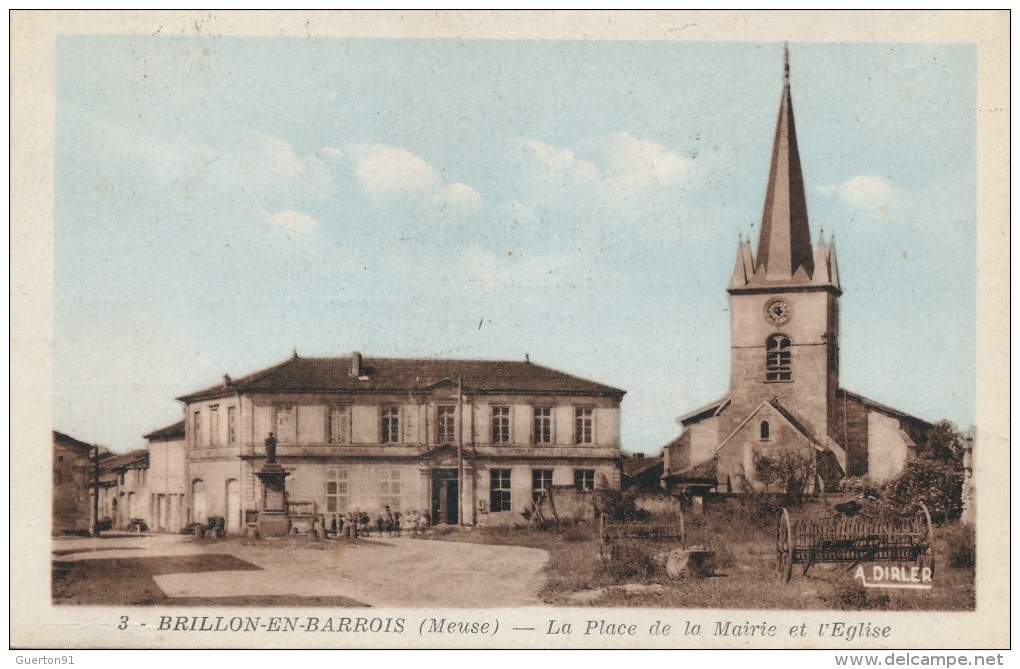Campaign History of the 151e Régiment d'Infanterie - XIV (Part III)
~ 1916 ~
Verdun - Second Tour (10-13 April)
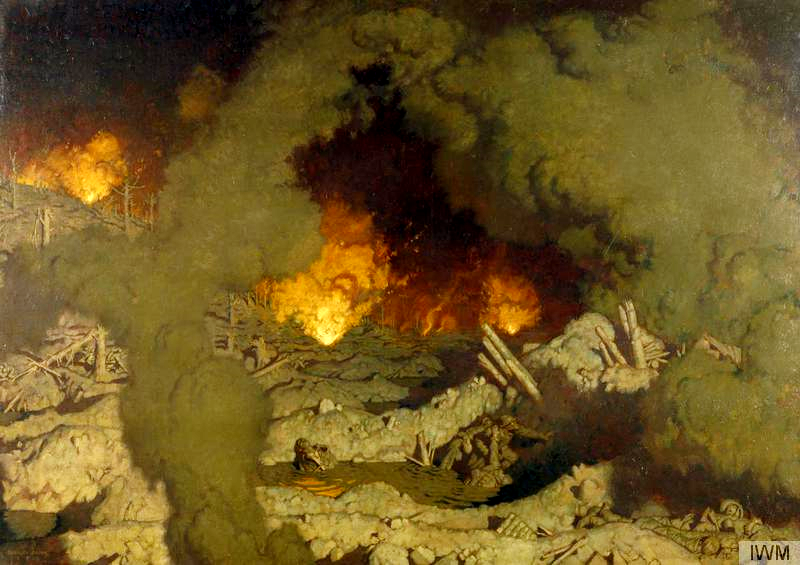
10 April: Thousands of German dead lay scattered over the slopes, on their parapets, in their trenches, in the shell-holes. Campana counted the number of dead in front of his section’s front alone to a depth of 200 meters at over 180. In the face of the onslaught, the 151 and the other units of the 42 DI had managed to hold back the enemy's might assault. Their stand inspired General Pétain's order of the day, who praised their heroic efforts and declared the now iconic words: "Courage, on les aura."
Back on Mort Homme, the German artillery opened up another heavy bombardment on the positions of 1 Bat. on the left. On the front of 2 Bat., the bombardment and fighting have stopped. Around 1730 hrs about twenty Germans leave their trenches opposite 10 Co. and carry out an attack with hand grenades and are quickly repulsed. A short while later, they make another attempt and are immediately welcomed by a strong fusillade, beating a hasty retreat.
The sector remained calm for the rest of the evening until around midnight, when the bombardment started back up again. This time the shelling seemed to be heavier then before. Henri Laporte referred to it as one of "unequal strength."
We were forced to make the most of the smallest shelter of fold of ground in order to stay alive, all the while holding the ground that we had been entrusted with. Not an inch of ground escaped the explosions. This time, we had considerable losses. It seemed the Germans wanted us to pay for their failure. This was their revenge. At 5:00 am, the bombardment was still just as intense. One heavy caliber shell, then two, then three, then by the hundreds. The 1st Section placed next to us, with thirty-five men, was completely crushed. I was sheltered with my captain and several poilus in a hovel constructed of interlaced logs and rails, which up till then had held up against the shots, despite some materials collapsing.During the night of 10-11 April, the 2 Bat. -- along with a company of 162 RI and a platoon of 94 RI (which had been brought up as reinforcement to the right of 1 Bat. -- are relieved by a battalion of 254 RI. The exception is 2 and 3 MG Cos., which are unable to be replaced. Heavy rain had moved in and turned Le Mort Homme into a quagmire. To make matters worse, the relieving force wouldn't arrive until very late, the relief not starting until 0300 hrs. Fortunately, a heavy fog settles in and allows the relief to be carried out without incident.We stood guard in turns behind a small mound of earth to watch the front lines. Around 10:00 am, it became impossible to remain in this position. We were forced to stay at the entrance of the dugout. How had it resisted such a long time under a deluge of fire so formidable? Heavy shells exploded right on our shelter, shaking it more and more with each new detonation. As I said, the ceiling of our shelter was composed of railroad irons (at least five or six layers thick) interlaced with wood beams as big as tree trunks. It was an ex-German command post. The entrance of the shelter began caving in more and more. We continually scooped out the earth to keep from being buried alive! It's true that, now and then, we began to get discouraged. We were close to abandoning this convict labor. Our strength left us, we were completely dazed by this bombardment, which continued with the greatest intensity on both sides. The Hell of gunfire, explosions. The air that we breathed was simply smoke impregnated with the smell of gunpowder, which made us ill. We suffered from violent headaches.
What's more, there was an uninterrupted rumbling above us. Imagine hearing right beside you a dozen heavy freight trains barreling along with unbridled speed: this was the passing of French heavy shells on their way to reap death across from us. Around noon, still in the middle of the bombardment, a poilu from a regiment on our left in liaison with us fell in front of our shelter entrance, stricken by an awful wound in the back. The poor man howled in pain, called out for help, but it was impossible for us to give him the least bit of assistance due to the violence of the explosions. Alas, his suffering was prolonged...His dulled eyes reflected the approach of death. In the few words that he still muttered, alternating with vomitings of blood, he called out for his mama. Though accustomed to seeing similar terrible fates, the heart ached. We couldn't speak a single word...
We were still evacuating and tossing out earth over our unfortunate comrade sprawled out, lifeless, very close by. Right at this moment, a heavy caliber shell exploded almost on the entrance of the shelter. We were buried; the comrades at the bottom of the shelter were already yelling at us to search for air. For those of us who were at the entrance, feeling the approach of death, our strength increased ten fold. Scraping out the earth with our fingernails, we soon started to dig a hole for air, although foul, to allow us to breathe again. It was a gas shell that had exploded. Working in shifts, we had to enlarge the hole and excavate the shelter entrance. The survival instinct had won! Sometime in the evening, the bombardment became less violent and with nightfall, we could finally leave our hole, which had really served as our tomb.
I accompanied my captain in our sector, which had been completely turned over. Only one machine-gun out of ten remained in a functioning state. The 2nd, 3rd, and 4th Sections had their strength reduced in half. The trenches were reorganized as best as possible. With the inspection over, we made contact again with our neighbors to the left and right, placed on the same line as us. A liaison agent went to report the situation to the sector commander. The beginning of the night was calm. Around 1:00 am, the bombardment started back up with the same intensity, but about two hours later it quieted back down. Again, we've suffered losses; the two sections placed on our right no longer existed...
Jubert however had to stay behind to provide instructions to the 254 RI. Exhausted but unable to sleep, he passed the time by counting the minutes and seconds, as he waited impatiently for another six hours. By that time, the German bombardment of the position had started back up again, and Jubert was forced to remain in the trench all day. Along the Chattancourt Road, a pall of smoke hung over the Colonel's ravine [Ravin de Chattancourt]. The shells now rained down all around him and the corrugated tin roof of his shelter vibrated as small shell-fragments plummeted to earth.
I felt my loneliness double in intensity. In this zone of Hell, far from all human life, I had the thought that I'd be hit and would be left until death came for me. I still had Fréville with me, but this misery that took hold of me was unbearable.
At noon, Jubert finally departed the first line and ventures out to the support positions hoping to find the 151's head commanders. For some time, he wandered along through deserted trenches, poking his head into the darkened shelters, in his desperate search to find a familiar face. When he does encounter living souls, they belong to other units. At last, he spotted a man at the entrance of a sap bearing the "151" insignia on his lapels. But as he gets closer his eyes behold a terrible sight: the man is seated on the edge, shoulders leaning against the earth, with his skull blow open and brains tossed beside him. He was still going through his final spasms, indicating that he'd only recently been struck. Jubert felt his wrist for a pulse, the heartbeat was very weak. But Jubert took a strange comfort in knowing he was at least on the right track to finding his unit.
A little further on he came upon a bunker in which several officers from the 151 RI's 2 MG Co. were sheltering. Surprised to see Jubert, they offered him some hot coffee. To pass the time as the shells continued to fall outside, one officer invited him to play checkers. As they did, they traded the little happenings and stories of the day, one of which they took to called "Tison's Surprise". Capitaine Tison was the commander of 2 Machine-Gun Company. The day before, Tison was standing in his little dugout and about to say that his shelter was not sound when he felt something suddenly strike behind him. Turning around he saw a terrified look on the faces of his men. Lodged in the middle of the suddenly opened hole was a still warm, glowing 150 shell that had failed to detonate. In the roof, where a cloud of dust still hung, was a clean hole where the shell had punctured through. Tison couldn't believe his eyes, but happy to be alive, he quickly sought out a new place to lay his head.
Meanwhile, the 3 Bat. would go into reserve behind 1 Bat., while the remnants of 2 Bat., which were sent to rest in the shelters of the Fort du Bois Bourrus, are unable to reach them before daylight and are held back in the Netter shelters for the day (11 April). Sous-Lieut. Auriac is transferred from 5 Co. to 9 Co. Losses for the regiment on 10 April include 11 killed and 20 wounded.
It was shortly after leaving the line that Jubert grew introspective as he considered the magnitude of the events he had just took part in. He wrote humbly: In the middle of combat, one is little more than a wave in a sea...a stroke of the brush lost in the painting...Courage, in our days, is a currency that is not depreciated, but tarnished by usage.
11 April: There is a violent bombardment of 1 Bat. on the left by shells of all calibers (77s, 105s, 150s, and 210s), while on the front of the battalion of 254 RI (on the right), things remain relatively calm aside from an exchange of grenades. The situation was growing ever more desperate on 295. Laporte described:
Day arrived, we had to entrench ourselves again, it was impossible to hold out exposed like this. And [the bombardment] lasts all day. For three days, we haven't been able to bring up any supplies. Hunger and thirst are particularly making themselves felt. Our strength begins to abandon us and there's no point in trying to organize any sort of fatigue party to the rear, to the kitchens.At night, 2 and 3 MG Cos. are relieved and 2 Bat. moves the Bois de Sivry la Perche. Jubert was with them and recorded:
Soaked, lashed by rain, for a long time we made little progress across the slippery ground and in the sticky liquid mud that our ankles sunk into. It seemed that -- jealous of us leaving with our lives, not wanting us to hope that the mass grave which grew ever larger and fertilized the ground -- Mort Homme made one last effort to keep us from leaving it.When Laporte's company was finally relieved he noted:After a ten hour march first in the nocturnal torpor of night, then in a foggy pale morning, then in a light rain in the azure blue afternoon...we had arrived at the place [Blercourt] where we had to board trucks.
Around 11:00 pm on the fourth day, April 13, a column of poilus, officer at the head, reaches us: it's come to relieve the 1st Machine-Gun Company of the 151st. What a relief for us, the few who had escaped! After having indicated our positions to the new arrivals, and after the captain had finished giving various instructions, we headed toward the village of Chattencourt. Six men remained in our poor company, six out of roughly thirty. Despite a heavy, sustained fire on our route, we arrived without a hitch at Chattencourt, which we crossed as quickly as possible. The presence of gas, lingering in the shell-holes and between the collapsed walls of the ruined village, gave us wings despite our great fatigue. We had already passed the dangerous zone, but up till then, we still hadn't encountered a single poilu from our regiment.Sous-Lieut. Erkeus is transferred from 12 Co. to 11 Co. Losses for the regiment on 11 April include 4 killed and 17 wounded.
12 April: No change in emplacements for the units in line. The is relatively calm. The 2 Bat. boards trucks at Blercourt and is transported to Combles, 10 km south of Bar-le-Duc. Losses for the regiment on 12 April include 1 killed and 5 wounded.
13 April: Intermittent bombardment of the regiment's lines. During the night 1 and 2 Bats., the MG Cos., CHR and staff are relieved by two battalions of 150 RI and march to Blercourt.
The 151e RI, along with the other units of the 42e DI, had been severely tested during their nine days on Mort Homme. Preliminary reports put the number of casualties for the regiment at around 500 killed and wounded. The real number is likely much higher. The other units of the 42e DI suffered similar levels as the 151. Many of those lost had been the untested recruits of the class of 1916. In their baptism of fire, they proved themselves as brave soldiers worthy of the regiment's feats in past battles.
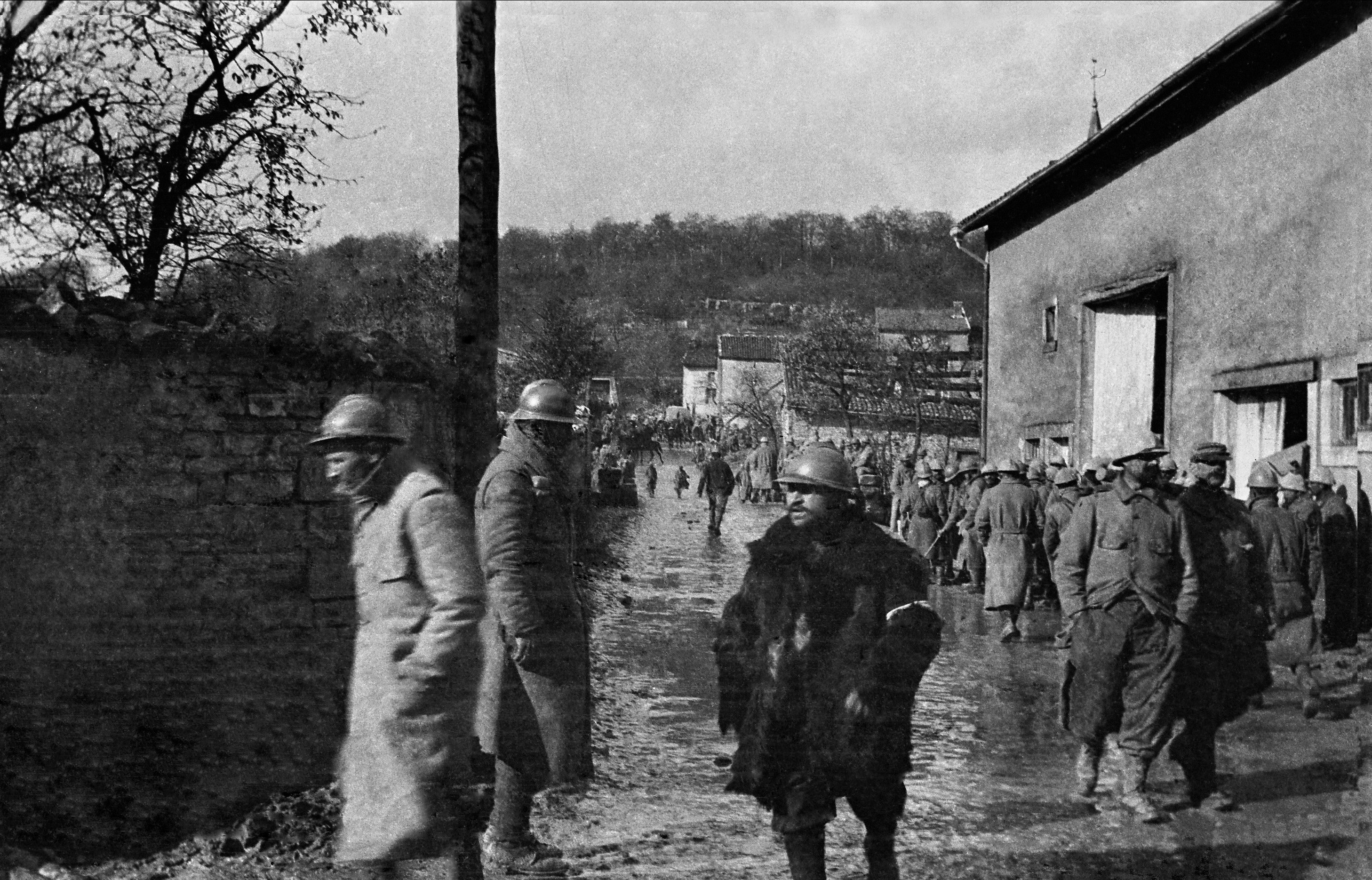
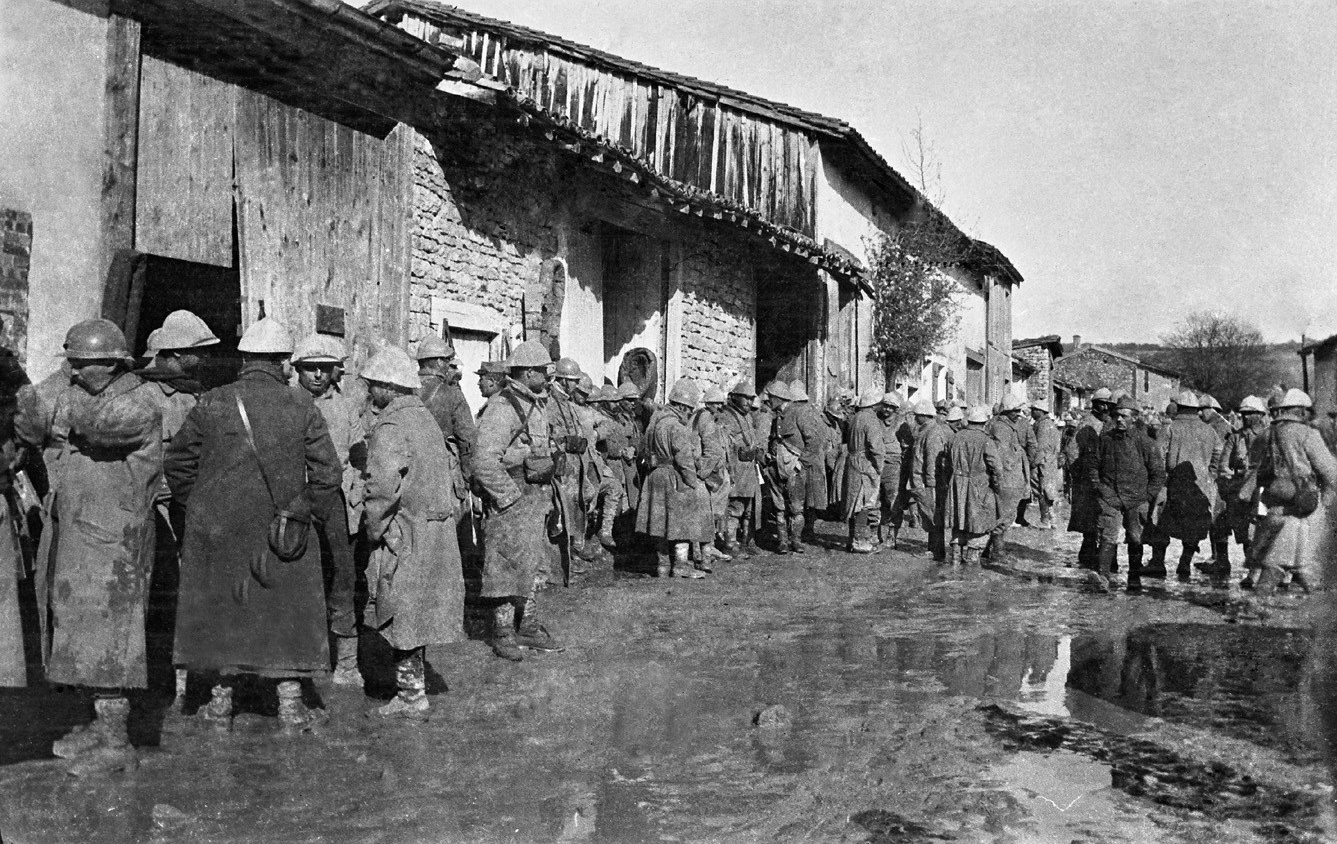
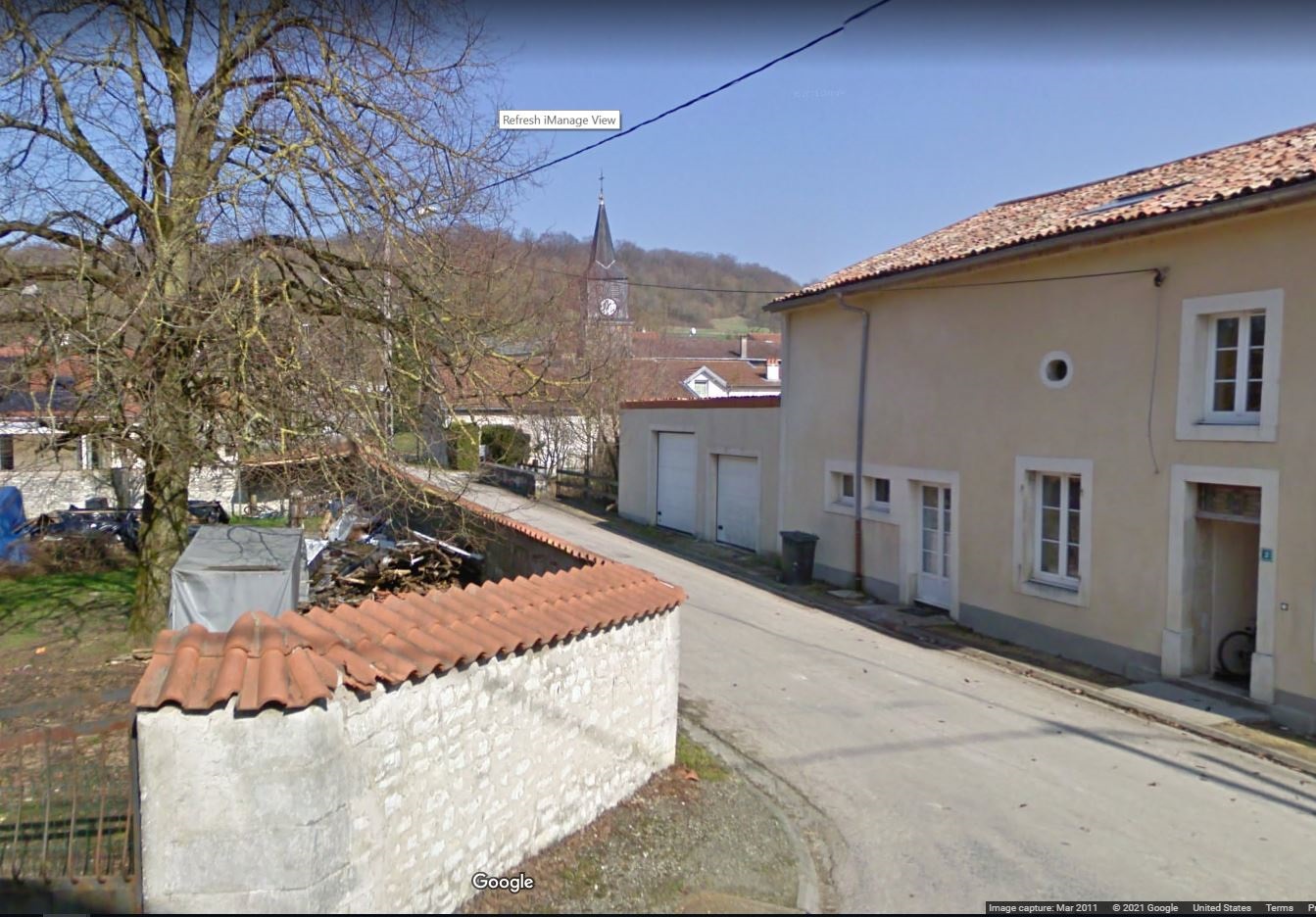
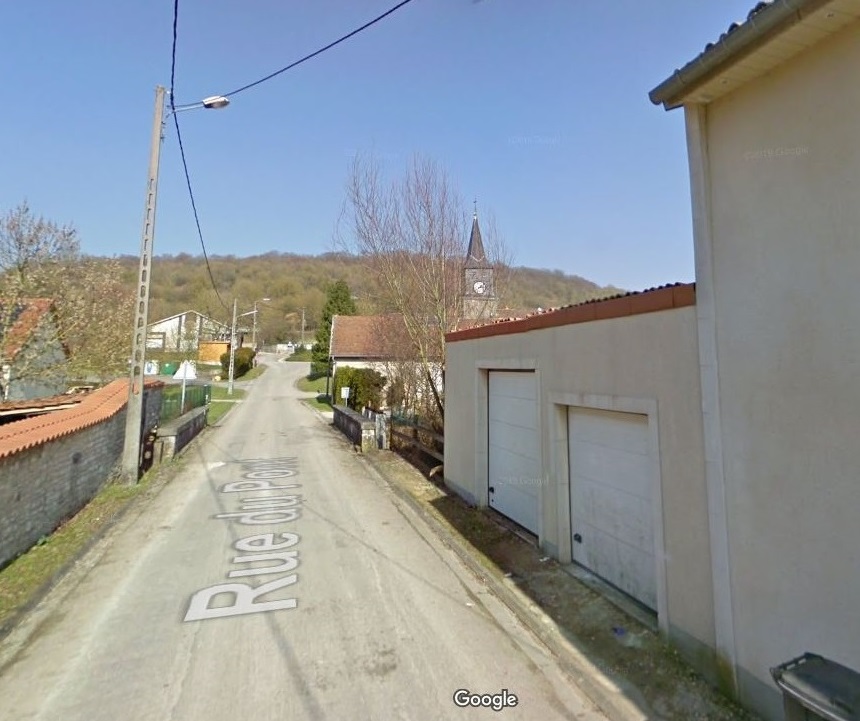
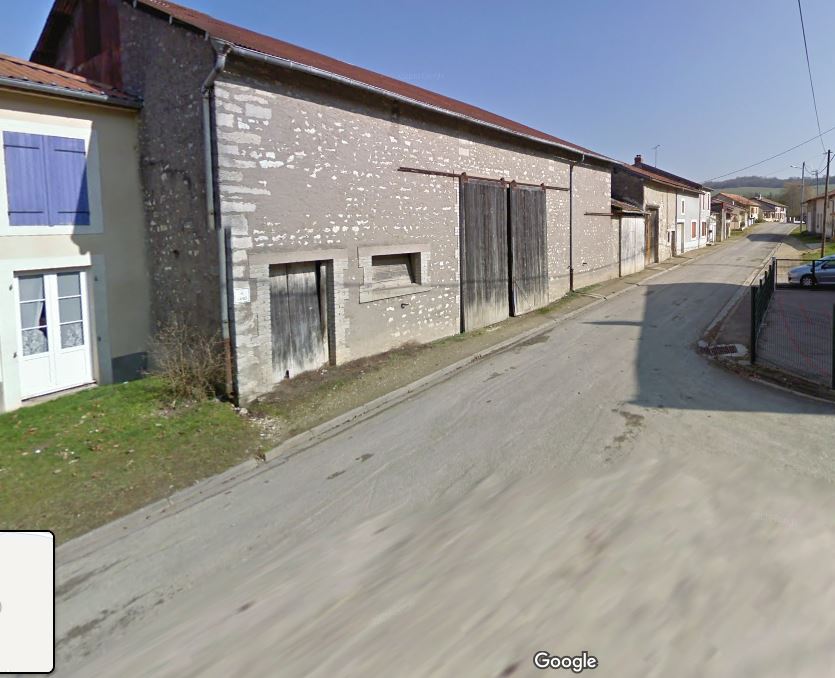
Top: Blercourt - 14 April 1916 (photo taken by Capt. Tison, 151 RI). Bottom: Google images of the same location in Blercourt today (location here and here).
14 April - 4 May: The units of the regiment at Blercourt board trucks and are transported to Saudrupt (south of Bar-le-Duc). Capt. Destrais (previously evacuated for illness) returns and takes command of 10 Co., while Second Lieutenant Laffont (from the 81 RI) takes command of 8 Co. The regiment remains at rest from 15-18 April, with the days spent washing up and cleaning uniforms, equipment and weapons. On 14 April, 2 Bat. leaves its billets at Combles [en-Barrois] and goes to Brillon [en-Barrois]. Sous-Lieut. Campana remarked about this period of rest:
We were in great need [of it] for the 2nd and 3rd Battalions are entirely decimated. In fact, all the regiments of the division had submitted heavy losses, but we could take pride in the having held our ground entrusted to us, having carried out our duty to the utmost.But Campana feared the effect that consecutive days off-duty would have on his men, noting that depression had overcome many. Some spent all day getting drunk at the wine merchants in the village, while others took advantage of nearby train stations to go AWOL for several days.

The village of Brillon-en-Barrois before the war.
We're now billeted in a wonderful village [Brillon] to the southwest of Bar-le-Duc. It's nestled in the greenery, a clear stream as our bath, wounded undulations circling it with a curtain of foliage. All exercises have been temporarily suppressed in order to give the men to recover from the difficult work that they had endured. It's a great calm, and in the fresh shadowy forests, lying on beds of moss and turf, I forget in soft dreams the hellish days that I've lived through.
One was a 20 year old soldier in Campana's company who had left his billets without permission when they arrived in Brillon and had been missing for four days. On the fourth day, the young man returned accompanied by his mother, who attempted to explain to Campana the reason for her son's apparent desertion. The mother explained that their home town was located in a region that had been invaded by the Germans in August 1914 and occupied ever since. Her son had fled to his aunt's house in Rodez, where he waited for his class to be called up. He had dutifully reported and served for 12 months, but during all of that time, he had not seen nor heard from his family. He was completely cut off. When the regiment arrived at Brillon, close to Bar-le-Duc, the soldier took a train to go see his mother. Once he confessed to her that he had not received a furlough, she insisted they return together to beg pardon. Desertion meant that the man would have to face a war council. Campana was sympathetic and assured them both he would argue in favor of leniency.
On 16 April, Sous-Lieuts. Canredon, Lurtigue, Basteau, Saurveutre, Gullot, Lamothe de Mondion, Campana, de Riancey, de la Ferrière, and Castet-Baron are definitively promoted to sous-lieutenants (having been brevetted on 25 December 1915). Lieutenant Boissin and Teisserenc are promoted definitively to captain. On 17 April, Commadant Chamousset coming from the depot of the 16 RI arrives and is assigned to 2 Bat. The following day Commandant Molochet coming from the depot of the 15 RI arrives and takes command of 3 Bat.
On 19 April, Capitaine Le Boulanger is promoted to Chevalier de Légion d'Honneur. Sgt. L'Huillier (6 Co.) is awarded the Medaille Militaire. The next day, in order to free up the billets at Saudrupt, 1 Bat. relocates to Brillon to new billets, while 2 Bat. goes to billet at Hironvolle. Beginning on 21 April, the regiment returns to its training instruction. An hour each morning is dedicated to specialist training while the evening is spent in exercises. On 24 April, at 1400 hrs the entire regiment holds a prise d'armes on the maneuver grounds at Brillon. Lieut. Caheu and Sous-Lieut. Moulin arrived with a detachment of reinforcements coming from the 9 Bat. (depot/training battalion) of the 151 and are assigned to the 1 and 2 Cos., respectively. The reinforcements consist of 249 troops and are composed of:
1 adjudant
8 sergents
16 caporaux
224 soldiers.
These replacements are followed by other detachments of reinforcements over the next several days, totaling an additional 411. These are comprised of:
19 soldiers from 258 RI
1 adj, 1 sgt-major, 2 sgts, 4 cap, 42 soldiers from 32 RI
1 adj, 1 sgt-fourrier, 3 sgts, 4 cap, 91 soldiers from 66 RI
1 sgt-major, 2 sgts, 8 cap, 35 soldiers from 90 RI
1 sgt, 1 cap, 25 soldiers from 141 RI
1 sgt-majpr, 1 sgt, 1 cap, 31 soldiers from 111 RI
1 sgt, 2 cap, 22 soldiers from 112 RI
1 soldier from 145 RIT
1 soldier from 151 RI depot
4 sgts, 8 cap, 119 soldiers from 118 RI
3 sgts, 6 cap, 78 soldiers from 19 RI
Campana speaks about this period of renewal and relearning, stating:
There weren't many of my old poilus from October [1915] left. Sickness and bullets had taken almost all of them. We've received new reinforcements recruited from all the depots...and my section is entirely reformed. I only see new faces around me, many are the young new recruits of the class of '16 and some recuperated wounded...Along with the influx of new enlistedmen, a number of officers were transferred over the period of 24 April to 3 May:
Sous-Lieut. Trannoy (66 RI) assigned to 3 Co.
Sous-Lieut. Salmon (90 RI) assigned to 10 Co.
Sous-Lieut. Bérail transfers to 8 BCP (MG Co. 2), while Sous-Lieut. Thiebaud comes over from 8 BCP (MG Co. 2).
Sous-Lieut. Adam (151 depot) assigned to 2 Co. Sous-Lieut. Bouliglio (141 RI) assigned to 4 Co.
Lieut. Ste. Croix assigned to 7 Co. and takes command
The following promotions occurr over the period of 24 April to 3 May:
Aspirants Dievait, Lemonte, Perraut, Adj, Meunier, Philippot brevetted to sous-lieutenants. Lieutenants Autier and Olivier are brevetted to capitaine. Sous-Lieut. Doumay is brevetted to lieutenant. On 27 April, Lieut.-Colonel Moisson presents the Croix de Guerre to the regiment, which forms up at the Brillon maneuver grounds for the occasion.
Among those received distinctions during this time of rebuilding is Sous-Lieut. Campana, who will be rewarded the Croix de Guerre for his actions on 9 April. Along with this award, Campana would be assigned by his battalion commander to fulfill the functions of the battalion grenadier officer. In this role, he would have under his command four sergents, 16 caporaux and 128 soldiers. Campana would begin their instruction on 28 April.
The regiment's period of rest and retraining was coming to a close. Before it did however, a tragic even occurred. On 29 April, Commadant Chamousset who had been transferred from the depot of the 16 RI to take command of 2 Bat. on 17 April, was killed in a grenade training accident at the grenadiers school. He would be buried with honors at the village church.
Despite the short amount of time he was with the 151, Campana was greatly affected by Chamousset's death. It was yet another tragedy that was all too common. Jubert also mentioned the loss of the commandant in his memoirs: I felt then how death is cruel in its games. It would be humane if it only killed in combat. This man, with numerous glories and magnificent past achievements, was the victim of a blunder.
On 2 May, the 151 held another prise d’armes at Brillon on 2 May at 0800 hrs, which was attended by General Deville. The regiment formed a square in the huge prairie, the blue of the men’s greatcoats matched the blue of the sky. In the ranks of 2 Bat., two sinister gaps were left indicating the placement of the 7 and 8 Cos. These units had been annihilated on the slopes of Mort Homme on 10 April, the men crushed under heavy mortar fire of the enemy’s minenwerfers or burned alive by their flame-throwers.
Galloping at the head of his staff, Deville passed before the arrayed troops before heading to the center of the square, where those who were to be decorated were formed up in a single line at the attention. With his sword held before him, Campana could barely contain his emotion. When the general pinned the Croix de Guerre on his chest and shook his hand, Campana considered it to be the most beautiful day of his life. As the ceremony concluded, Campana’s eyes fell down several times to the red and green ribbon suspended from his chest.
Another officer who would eventually receive a Medaille Militaire for his actions was Sous-Lieut. Jubert. He and his company received honorable mention in the dispatches. Jubert did not seemingly share the same enthusiasm that Campana did. When he was awoken after only getting a short amount of sleep, Jubert preferred to get some more rest over receiving a decoration. For Jubert, there was very little from this period of rest that made an impression, save for two memories that:
...only seemed to add to the bitterness and deep sense of harshness which, despite the mask that we put on at times, constituted the most solid foundation of our character. What made up the misery of this war were only the tableaux which framed it. We got used to this life so that we lost all contact with real life. We laughed at death if it respected the conditions under which we spilt our blood... ...we were at Bar-le-Duc. After being in combat, we felt here how much we'd lost touch with the ordinary world. Things and beings took on an unfamiliar aspect that was new to our eyes. We were wild Indians [Iroquois]. We passed by fancily dressed servicemen in stupefaction, whose uniforms to our eyes constituted a festival to which we felt like strangers. Our faded greatcoats, our boots darkened with polish, our pathetic appearance that we could constantly see in the reflection of storefront windows gave us, even to ourselves, a sense of pity. In the glances from these distant lordly men, the gap that separate us form them became apparent. In the heart of the soldier there is a spirit of humility that comes out of being in combat.Since his first tour at Verdun, something had clearly changed inside Jubert. Around this time he began writing his memoirs, which he completed while convalescing after being wounded a year later on the opening day of the Chemin-des-Dames offensive on 16 April 1917. He recorded this internal-shift in an insightful self-examination:
"What sublime feeling took hold of you as you went into the attack?The sober reality of the long war seemed was also reflected in Campana's memoirs, as recorded in a conversation he had with one of his men who'd been a missionary in the Congo before the war. The man minced no words with Campana, who related his experiences of living in an uncivilized part of the world where cannibalism and the slaughter of prisoners taken from other tribes was common. Anger, vengeance, and lack of faith had led to horrible acts, the missionary preached to Campana:
---"I was thinking only of pulling my feet out of the mud they were stuck in.
"What heroic cry did you utter when you had recaptured the crest?
"What feeling of power did you have when you had defeated the enemy?
---"I was annoyed, because the grub wouldn't get to us and I'd spend several more days without any pinard.
"Was your first act to give thanks to God?
---"No, I went off alone and relieved myself."*[A polite euphemism for the word "merde".]
"...And so I'm told that on April 9th, on Mort Homme, a certain lieutenant who I know gave the order to take no prisoners even though about forty German soldiers were ready to surrender.After two weeks of rest, refitting and retaining, on 4 May, the 151 is alerted that it will be heading back to the front the next day -- back to le Mort Homme.
"Thank you for trampling through my garden, but on October 6th [1915] the enemy acted even worse and I swore to avenge the victims of their barbarism and for a Corsican, such an oath of vendetta is a sacred thing.
"But these men you killed, or had to be made killed, had nothing to do with those from October 6th.
"They wore the same uniform, they share the same blood, as a consequence they were responsible for the crimes committed by their comrades, and under the same circumstances they would have surely acted in the same way. And even if I had given the order to my men to not shoot, they would've been too overexcited to obey me.
"I would have obeyed you, for pity sake.
"In combat one doesn't think about pity, only of how to do right by the country. Only that alone counts and takes all other consideration. And to your criticisms, I'll respond simply with these three words: "That is war." And we must win and win at any price!"




